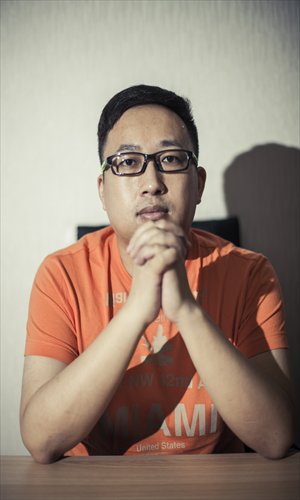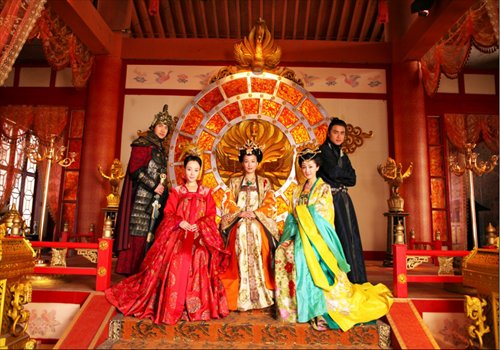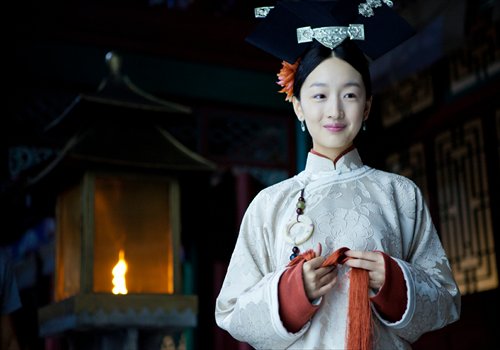Confident amid controversy

Portrait of Yu Zheng Photo: Li Hao/ GT

A poster for Women of Tang Dynasty

A scene from The Palace Photos: CFP
Among all the TV drama and movie genres in China, costume dramas have always been an indispensable part. And like Steven Spielberg is a signature figure for sci-fi movies in the US, scriptwriter and producer Yu Zheng has made his name a byword for costume dramas in the Chinese mainland, despite various controversies surrounding him.
Yu has never directed any of his works, but his name is much better known than any of those directors. Over the past 10 years or so, about 20 works written or adapted by Yu have been made into TV dramas. In that time, audiences and industry professionals have sometimes criticized the programs; nevertheless, he has successfully brought up a number of new stars, such as Yang Mi, Yuan Shanshan and Zhao Liying, and made names like Ruby Lin, Zhou Dongyu, and Lu Yi return to the audience's attention.
Earlier this month, Yu's first movie work The Palace was released - a new step on the path for his future work.
Women's stories told by a man
Yu is best known for Palace, a time-travelling costume TV series based on the actual history of the early Qing Dynasty (1644-1911). After airing on Hunan TV in 2011, it not only became a hit at home, but also brought Yu an award for Best Drama Screenplay at the Asian Television Awards (ATA) the same year. In the years before and after, Yu's other popular works include Schemes of a Beauty (2009), Women of Tang Dynasty (2011), Palace II (2011), and In Love with Power (2012) - all telling women's stories set in the imperial palace.
In a face-to-face interview with the Global Times early this week, Yu revealed that, in fact, he dislikes people thinking that he is a sissy man who is immersed in women's trifles.
"My first script, Assassinator Jingke, was written from a man's point of view. I myself thought it was perfectly written, but [when it was aired in 2004] there was little good feedback, even my mom did not like it," he said.
Yu did not realize the women characters under his pen could be so popular until The Legend of Knight (2006) and The Harem of Qing Dynasty (2006).
With The Legend of Knight, though it centers on a swordsman, Yu found few viewers paid attention to the central hero. Instead, discussions on the Internet focused on the female characters.
Then the popularity of The Harem of Qing Dynasty, Yu's first story set on women in the palace, gave him strong confidence in writing women's stories. But Yu thinks he is still writing women from a man's perspective.
Compared to similar works written by female scriptwriters in China, Yu found that his works often contain a group of women, and he likes to write them in comparison with each other. But in most female scriptwriters' works, there are often only one or two female figures, who are the center of attention of a number of men, Yu said.
Yu thinks the key reason his works are appealing is that they "resonate with the modern audience."
Why all the critics?
Born in 1978, Yu is no doubt one of the few scriptwriters who achieved financial success at such a young age. Yet, criticism of him has risen along with his fame.
In 2011, before Yu received his Best Drama Screenplay award at ATA, he was also selected by the Chinese netizens as the most dislikable male entertainer of 2011, for they believed he was "using his lifetime to plagiarize."
From his early work The Harem of Qing Dynasty, to Schemes of a Beauty, to his latest Coming Home: the Lost Daughter, netizens can always pick up similar plots between Yu's stories and others' scripts.
Yu said he had been troubled with such criticism, but now he seems to be taking it in stride.
"Any work is not like money, which can be loved by all," he answered to the Global Times, adding that many famous people's work, have borrowed ideas from previous classics as well. Lin Yutang's Moment in Peking borrowed from A Dream of Red Mansions, and director Feng Xiaogang's movie The Banquet (2006) borrows elements from Hamlet, Yu said.
Criticism of Yu comes from industry predecessors as well. In an interview with Southern Metropolis Entertainment Weekly, Chinese mainland TV producer Zhang Jizhong once commented that Yu's adapted TV version of Xiao Ao Jianghu (one of Louis Cha's wuxia novels) was "unwatchable" and is "a badly adapted story."
"Maybe when I am at that age, I will also criticize a young man. I cannot say I have a broad mind" was what Yu answered to the media later.
The Yu Zheng model
Yu Zheng is a person who is never slow to praise his own works.
"My dramas have always made money," Yu said to the Global Times. The same sentence has been repeated to other media as well. And his path to success seems to follow two tracks - he knows how to tailor a story to an actor and he is good at businesses.
After years racking his brain for scripts, Yu came up with a new way - tailor a story for an actor. "It's easier for both the writer and the actor," he said.
Yu explained that traits of his early characters were somehow contradictory, but later as he followed an actor's personality to write stories, everything went smoothly.
There is no need to think over and over how the figure would react when coming across a certain issue, Yu said. And the actor is able to perform more naturally.
While many producers like to use famous stars to help attract attention to their works, Yu prefers young actors or those with declining fame. "It's risky, but I like taking risks," Yu said, "It turned out I never failed in doing so."
Now, with his first big-screen film screening in cinemas, Yu is still doing things his own way.
Yu told the Global Times that while most Chinese filmmakers produce only one movie at a time, the 115-minute movie The Palace will also have a TV version, along with derivative products.
While admiring Ang Lee's ability to combine artistic ideas with commercial success, Yu said he cannot follow Lee's way of spending years to only produce one work.
"How many years does a man have in a lifetime? I just want to be a commercial filmmaker," Yu said.